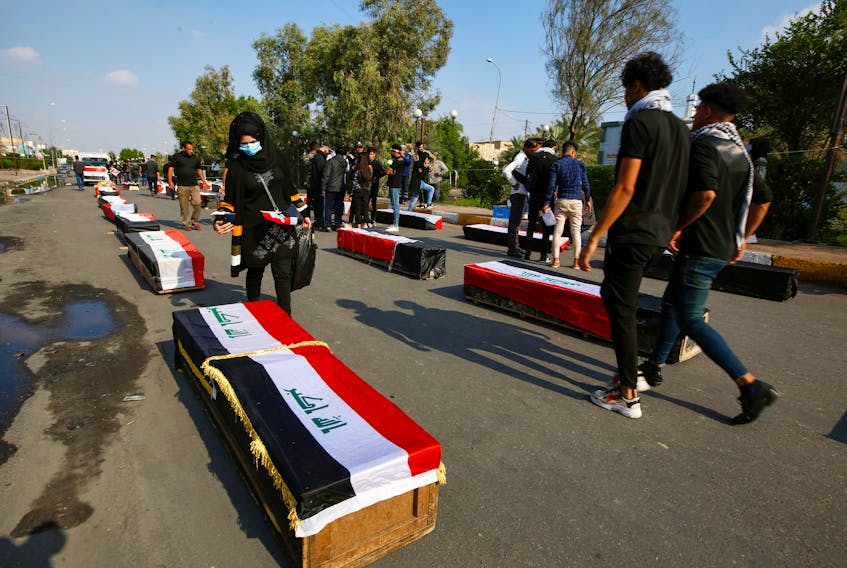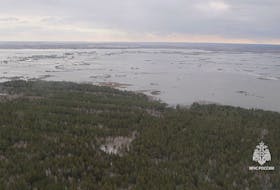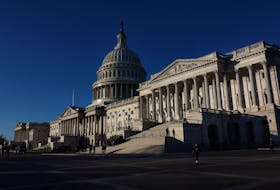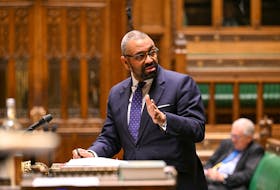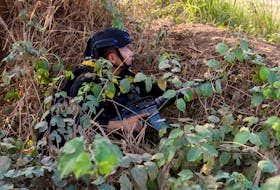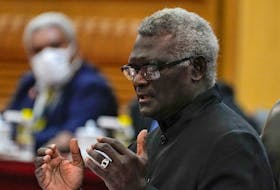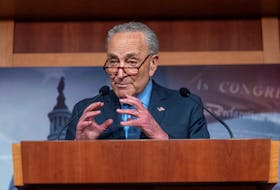By John Davison
NASSIRIYA, Iraq (Reuters) - A short distance from a bridge in southern Nassiriya where Iraqi security forces gunned down their friends, young women and men set out rows of mock coffins, each draped in an Iraqi flag with pictures of the slain protesters taped on.
Murtadha Jodeh, a 25-year-old demonstrator who witnessed the killings that took place before dawn on Thursday last week, walked between more than 40 coffins laid out in three lines on the tarmac.
"This man, Mohammed, was killed by a bullet to the neck. Karar was shot in the side of the head. That other man in the heart," he said, pointing at each picture he recognized.
Raad Harbi, a 21-year-old camping out on the fire-blackened bridge on Wednesday days after security forces withdrew, said clashes lasted nearly two hours.
"They killed the last of my friends I'd protested with since October. I'm the only one left," he said.
Activists carried the coffins through the city, joining a mile-long march commemorating scores of Nassiriya residents killed in two months of demonstrations against the Iraqi government.
The clashes around Zaytoun Bridge on the Euphrates River were the single deadliest incident since unrest hit Baghdad on Oct. 1 and swept through southern Shi'ite Muslim heartlands, jolting Iraq out of two years of relative calm that followed the defeat of Islamic State.
Police and medics in Nassiriya said security forces killed 46 people after they opened fire on demonstrators blocking the bridge and other adjoining main roads.
Paramedics described scores of lethal wounds from rifle and machine gun fire against unarmed protesters. More than 400 protesters and more than a dozen members of the security forces have died in the unrest, including nearly 100 people in Nassiriya.
Iraq's government denies its forces have shot live ammunition directly at protesters and says they are there to protect them. It blames violence on unidentified saboteurs.
Some protesters have used petrol bombs and slingshots against police and public buildings and burned down the Iranian consulate in the southern city of Najaf last week.
In Nassiriya, Iraq's fourth-largest city and one of its poorest, the killings have fueled anger against authorities and Iran-backed political parties and militias that dominate state institutions.
'SAME BLOODSHED AS SADDAM'
Nassiriya is home to powerful southern Shi'ite tribes, birthplace of the Baath party that ruled the country under dictator Saddam Hussein and houses headquarters of Iraq's main Shi'ite, Iran-backed parties – now blackened, ransacked and abandoned after protesters torched them in October.
Activists who now control main thoroughfares and bridges in the city including Zaytoun Bridge say the bloodshed has stiffened their resolve.
They vow to stay put until the demands of Iraq's popular uprising are met - an overhaul of the political system and the departure of its corrupt ruling elite which they say has kept ordinary Iraqis poor and jobless.
Protesters inched a step closer to that goal after Prime Minister Adel Abdul Mahdi, a Nassiriya native, announced his resignation last week.
"The PM isn't enough – they all have to go," said Talib Faris, a tribal leader mourning the loss of two members of his clan at a square in the city.
He listed names of politicians including leaders of Iran-backed militias who have grown their power over government and parliament since the toppling of Saddam in a 2003 U.S.-led invasion.
"We don't want foreign interference, we don't want Iran. This is the same bloodshed as under Saddam, now at the hands of Shi'ite parties," he said.
As he spoke thousands of mourners poured into the square weeping and singing. Elderly tribal leaders struggled to keep up with energetic youth marches.
"Our generation is over the distraction of sectarianism. Look at the youth protesting in northern Sunni areas to support us," said Karar Hacham, a 30-year-old medic and activist.
"Some of the young men who died on the bridge didn't even have a place to sleep. This anger won't go away."
(Reporting by John Davison; additional reporting by Ahmed Saeed, Baghdad newsroom; Editing by Angus MacSwan)

